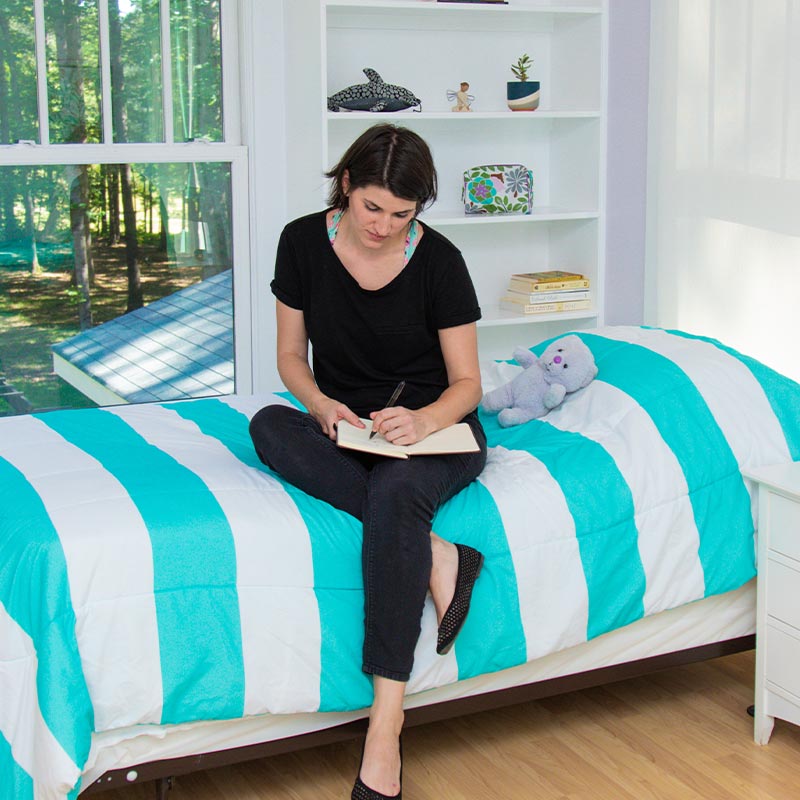Carolina House helps change the lives of individuals struggling who are struggling with self-harming behaviors. Carolina House proudly serves people of all genders age 18 and older from across the country who are struggling with self-harm.
Self-Harm Treatment
Learn more about self-harm treatment at Carolina House in North Carolina
Those who face challenges with their mental health encounter significant hurdles in their daily lives. The emotional and psychological distress caused by these conditions can be overwhelming. Unfortunately, it is not uncommon for individuals struggling with their mental health to engage in self-injurious behaviors. The presence of such behaviors alongside mental health disorders can be extremely harmful and pose serious risks. Fortunately, effective treatment and rehabilitation options are available at specialized centers like Carolina House.
Carolina House, situated in North Carolina and serving clients from South Carolina and all states nationwide, acknowledges the complexity of mental health disorders. We recognize the immense difficulty individuals face in overcoming these challenges. Moreover, we understand the profound impact that self-harming behaviors can have on one’s overall well-being. At Carolina House, we offer a range of comprehensive treatment and rehabilitation services specifically designed to address mental, physical, and spiritual aspects. Our goal is to support individuals in achieving sustainable recovery, enabling them to lead fulfilling and healthy lives.
How to Help a Loved One
Helping a loved one get treatment for self-harm
When you have a loved one who is struggling with the chronic desire to self-harm, you are likely feeling worried, anxious, and fearful. However, you might also feel as though you have done everything in your power to help your loved one get the help he or she needs, but have been unsuccessful. This is not uncommon, and it is imperative that you do not become discouraged if your attempts have not worked thus far. There are always things that you can be doing to help guide your loved one towards obtaining the treatment and rehab at a professional center specializing in self-harm that will save his or her life.
For starters, obtaining as much information as you can will dramatically help you in handling this life-threatening situation. Spend time learning about the many symptoms, effects, and dangers related to self-injury.If appropriate, share your knowledge with mutual friends and family members of your afflicted loved one so that they are informed as well.
Locate treatment and rehab centers that can help your loved one with his or her compulsion to self-mutilate. See if the treatment and rehab centers supply options for care that work within your loved ones means, and consider calling the admissions department to learn how that treatment center care provides care for self-harm.
Keep an open and honest dialogue with your loved one. Let him or her know about your many concerns, and provide examples to explain to him or her why you are feeling the way you are. Let your loved one know that when he or she is ready for treatment and rehab for his or her self-injury, that you can be a reliable and effective source of support and encouragement.
It is important that when your loved one accepts treatment and rehab at a professional center specializing in self-harm, you supply him or her with as much support as possible. Keeping him or her feeling encouraged while obtaining treatment can help him or her make tremendous strides in recovery.
Why Consider Treatment
Why consider treatment for self-harm at Carolina House in North Carolina
While death is the most tragic result of self-injurious behaviors, there are many other effects that can cause an individual to suffer serious damage to his or her physical and psychological condition. For example, self-harm can lead to infected wounds and permanent scars. Both conditions together can cause an individual to withdraw socially, develop anxiety or depression, experience strained relationships with his or her loved ones, become unemployed or homeless, and more. The good news is that the compulsion to self-harm can be effectively treated and individuals can go on to live healthy and balanced lives. With proper treatment from a self-harm rehab center like Carolina House, located in North Carolina and also serving South Carolina and all states nationwide, recovery is possible.
Types of Treatment
Types of self-harm treatment offered at Carolina House in North Carolina
Since 2006, we, at Carolina House, have been devoted to providing world-class, gender-inclusive residential treatment and rehab to those who are in need of comprehensive treatment to overcome the compulsion to engage in self-harm. Situated in a serene, wooded setting, Carolina House offers clients of all genders age 18 and older a tranquil environment that is fully conducive to true and lasting healing. We hold ourselves to a standard of excellence in the care we deliver so that anyone who engages in treatment and rehab at our center for self-harm with us can succeed in discovering a renewed life of wellness.
At Carolina House, located in North Carolina and also serving South Carolina and all states nationwide, we have made it our goal to provide a beautiful, safe, and nurturing environment that is run by highly trained and supportive staff. We use a structured, multifaceted treatment approach that is designed to usher clients successfully into life-long recovery. Our treatment and rehab approach at our center for self-harm also encourages self-exploration towards transformation through self-nurturing expressions of living. This goal and these treatment and rehab approaches are met by providing clients with individualized treatment plans that are catered to meet each of their very unique needs. Various aspects that may be incorporated into these treatment and rehab plans at our self-injury treatment center are described in the following:
Medication management: When individuals are battling the compulsion to self-harm, the use of certain medications may be recommended in order to help alleviate some of their distress. Clients at our treatment and rehab center for self-injury have the opportunity to meet with a psychiatrist once or twice a week in order to determine the need for any medication, as well as to monitor the therapeutic effectiveness of any medication prescribed.
Individual therapy: Clients are provided with one full individual therapy session each week that typically lasts between 45 and 60 minutes. Additionally, clients will meet with their therapists for one or two brief check-in sessions every week, each of which may last anywhere between 20 and 40 minutes. These sessions are designed to provide clients with an opportunity to meet in a private, confidential setting with their therapists so that they can discuss their progress in treatment, process through any setbacks that may have arisen, and celebrate any successes that have occurred while in treatment and rehab for self-harm at our center.
Family therapy: Recognizing how important family involvement can be in our clients’ successful recovery from the compulsion to self-injure, the staff at Carolina House, located in North Carolina and also servicing South Carolina and all states nationwide, frequently incorporates family therapy into our clients’ treatment plans. Family therapy sessions are typically offered on a weekly basis, meeting for an average of 45 to 60 minutes for each session. If deemed appropriate and therapeutically beneficial to clients, additional family sessions may be added on an as needed basis.
Group therapy: When working to overcome self-harm, group therapy sessions have proven to be incredibly beneficial and effective. Clients typically participate in an average of six group therapy sessions each weekday, four group sessions on Saturdays, and two group sessions on Sundays. These group therapy sessions are typically broken down as follows:
- Dialectical Behavior Therapy (DBT) Groups take place three times per week and are facilitated by a licensed clinical social worker who is specially trained in DBT.
- Interpersonal Process Groups occur three times per week and are dually led by a licensed professional counselors and other qualified professionals who have been fully trained in the group modality.
- Two Integrated Health Groups take place each week, including Addictions Education and 12-Step Facilitation. These are led by a licensed clinical addictions specialist and are attended by all clients. Weekly AA and NA meetings are also made available to clients who need them.
- A variety of other groups occur during the week as well, including both process and psychoeducational groups. The topics that are covered during these sessions vary but may include discussions on body image, media awareness, empowerment, relapse prevention, nutrition, and guided self-care, among many others.
Experiential therapy: In order to offer clients a holistic approach to the treatment, Carolina House offers a number of experiential therapy options at our self-harm treatment and rehab center in addition to the more traditional therapeutic interventions. Examples of these therapies include the following:
- Yoga therapy
- Art therapy
- Culinary Group
- Embodying Recovery (a sensorimotor psychotherapy group)
- Body movement activities
- Games
- Strength training
- Walks
Additionally, keeping in mind that recovery is an ongoing process, the staff at Carolina House is dedicated to ensuring that clients have a definitive plan set in place prior to their being discharged. From the time of admission to our treatment and rehab center for self-harm, clients’ primary therapists are assessing their outside resources and determining what services need to be in place in order to support a smooth discharge plan. Typically, the goal will be to step down to a lower level of care slowly so that clients can be fully prepared for increased independence.
If you or a loved one is suffering from a pervasive need to self-harm, the staff at Carolina House wants to help. Located in North Carolina, and also serving South Carolina and all states nationwide, our world-class programming at Carolina House can help you overcome the symptoms that plague you, while also assisting you as you develop the confidence needed to embark on a bright and promising future. Do not continue to suffer. Let the staff at Carolina House show you that there is a better way to live.











